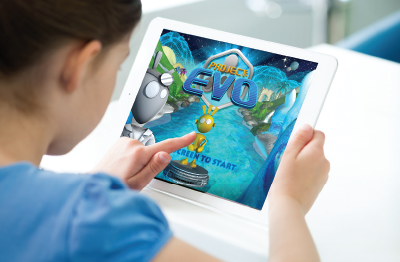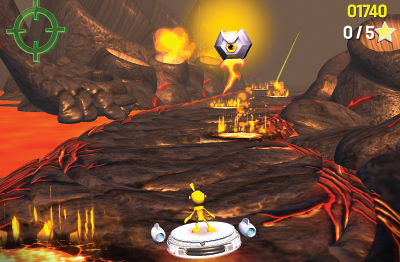Sugar-coated pills and fruit-flavored syrups are common tactics used to make oral medications more palatable to children. Could a video game offer the same opportunity to “sweeten” a cognitive-based therapy?
Researchers at Akili Interactive Labs believe the answer to this question is yes. Akili is finalizing a digital game-based “drug” for attention-deficit/hyperactivity disorder (ADHD) for which the company plans to seek Food and Drug Administration (FDA) marketing approval.
As Akili co-founder and chief executive officer Eddie Martucci, Ph.D., told Psychiatric News, the therapeutic core of the company’s tablet-based video game, titled Project: EVO, is an adaptive algorithm designed to stimulate visual and motor networks in the brain in a very specific way. The game itself is the delivery vehicle, much like a drug capsule.
The algorithm was initially developed by Adam Gazzaley, Ph.D., of the University of California, San Francisco, as a tool to stimulate the brains of older adults with mild cognitive impairment. Some pilot data showed that older people who used the stimulation program experienced improvements in attention and impulse control, which are hallmark problems of ADHD, so Akili decided to adapt the algorithm and embed it in an engaging and colorful video game for youth.
The process of developing this game has been a bit of a cultural shift for Martucci, who once viewed drug design as limited to understanding how molecules bind to proteins and receptors. Martucci said he never imagined that years later he would be part of a biotech with an in-house game studio, where he oversees design decisions that involve background colors and sound effects.
Though many details of Project: EVO are still under wraps, Martucci explained that the basic elements of the game involve navigating an on-screen character through a range of levels, using both the touchscreen and movement of the tablet to respond to the environment. The player’s actions are designed to stimulate key neural circuits in the prefrontal cortex of the brain—a region known to regulate attention and impulse control. Based on the player’s performance, the game difficulty rises or falls, ensuring that the cognitive stimuli are always pushing the participants to their maximum ability level.
Over time, one might expect that most players would get better at the game, but will that translate into any clinical improvements? The company recently completed a large clinical study that suggests it might.
The STARS-ADHD (Software Treatment for Acutely Reducing Severity of ADHD) trial enrolled 348 children with ADHD and compared the effects of Project: EVO therapy with a word-based puzzle game. After four weeks, the children in the Project: EVO group—who played about 30 minutes a day on average—showed significantly greater improvements in an objective assessment of attention known as the TOVA (Test of Variables of Attention) than those in the word-puzzle group.
Scott Kollins, Ph.D., director of the ADHD Program at Duke University Medical Center and lead investigator of the STARS-ADHD study, said he is hopeful that this program can provide a new avenue of nonpharmacological ADHD therapy. “This study represents a first step in evaluating an entirely new class of interventions for management of ADHD,” he said. “There is certainly more we need to learn about the nature of the intervention, but this first step is exciting.”
Kollins, who also serves as a consultant to Akili, noted that while TOVA is a valid neuropsychological measure of attention and inhibition, the degree to which the measure is related to other more traditional rating-based approaches to measuring ADHD is not clear. He said many children with clinical ADHD did not meet the criteria for the STARS-ADHD study because their TOVA scores were not impaired enough. Also, while TOVA scores improved after four weeks of game playing, there were no significant differences between the two groups of children on the Clinical Global Impression (CGI) scale.
The lack of a clinically relevant difference between the two groups may be because the therapeutic dose was limited, Martucci said. Unlike a medicine, which can be quickly ingested by a patient, this game requires active participation by the patient over time.
For the STARS-ADHD study, the researchers settled on a dosing regimen that would fit in the schedules of most school-age children: 30 minutes a day, five days a week. To eliminate potential digital overdosing, the program locks a child out after 30 minutes of play.
Those 30-minute doses work well for busy children and parents who may worry about excess screen time, but Martucci acknowledged the time limit may impact the therapeutic effect. According to Martucci, one of Akili’s major pushes for this year is to conduct more research on dosing to see whether playing slightly longer sessions might lead to more pronounced improvements.
“For our product to be viable, we need to see good clinical benefits in a reasonable amount of time,” said Martucci.
Another common concern with medications is adherence, and this issue is likewise pertinent with Project: EVO. The application transmits game data to clinicians, so they can monitor a child’s progress regularly—and see if the game was played or the child just turned the device on and then walked away. “One of the benefits of our approach is that many aspects of the game are not part of the core algorithm,” Martucci said. “So, we have a lot of ability to improve or add content and keep the game fresh.”
Martucci also noted that some preliminary work suggests the neurological changes induced by the game might last for weeks or months, so children may not need to play Project: EVO for extended periods. The company is working on a request to the FDA to have their program cleared as a digital therapeutic.
“It will be important to understand the effectiveness of this therapeutic tool in the real world,” John Torous, M.D., a member of APA’s Committee on Mental Health Information and Technology, told Psychiatric News. “Learning how skills learned in the game translate into improvements at home, school, and social situations will be critical.”
Torous added, “Digital therapeutics are an area of tremendous potential for the field, and as new competitors surely enter the market for therapeutic video games, it will be important to learn the strengths and weaknesses of each software platform and approach.” ■



